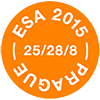RN Coordinator:
Ben Gidley, University of Oxford, Oxford, UK
Ben.gidley(at)compas.ox.ac.uk
|
The 12th Conference of the European Sociological Association will be held in Prague 24-26 August 2015. The ESA Research Network 31 on Ethnic Relations, Racism and Antisemitism invites submissions of papers. We will hold sessions that focus on theoretical, methodological and empirical aspects of research on racism and antisemitism, especially in a comparative framework. The network’s perspective is to bridge the divide between the understanding of antisemitism and of racism, and to explore the correspondences, contiguities and contrasts across this divide. Our over-arching question is to understand what are the social, political and intellectual conditions that shape variations in antisemitism, racism and other forms of intolerance across time and across different European and global contexts. In 2015, we particularly want to focus on the relationship between antisemitism and racism as ideology and as social practice, including how they are deployed in legal contexts, everyday speech acts and political discourses.
The general theme of the ESA conference as a whole is Differences, Inequalities and the Sociological Imagination in a context of globalisation, and we particularly invite papers that address this theme. We propose general sessions which will address the theme in the following way.
In the context of this larger conference we welcome a wide variety of papers concerning ethnic relations, racism and antisemitism. We particularly encourage:
The cosmopolitanism of ‘cosmopolitan Europe’ has tended to derive from the Western European tradition where (national) differences are acknowledged within a common (European) cultural framework. At the same time, a particular understanding of (European) ‘universality’ is posited against those (non-European) ‘others’ who are more often associated with a diversity that constitutes ‘multiculturalism’. However, this is only possible to the extent that it rests on a particular understanding of European history, one that evades acknowledging European domination over much of the world as significant to that history and one that also understands ‘being European’ and ‘being white’ as synonymous. In the process, longer histories of connection and entanglement that have created multicultural societies are disavowed. How, precisely, differences are understood and recognized as cosmopolitan differences or multicultural differences is not clear, except insofar as they map onto some notion of visible, that is, racialized – or, then, more recently, religious – difference. This session recognises the long-standing historical presence of Black Europeans and Black Europe and seeks to draw attention to these absent histories within dominant social science conceptions of ‘cosmopolitan Europe’. In the process, it also seeks to broaden and reconceptualise existing understandings of European cosmopolitanism and the sociological imagination that is informed by these understandings.
This session will reflect on shifting meanings, boundaries and consequences of difference. Papers will explore how the interplay between the production of racialised difference and the management of difference via policy and practice has changed over time and how this relates to the changing patterning of social and economic inequalities. In particular, we welcome papers that situate discussion in local, national and regional political, economic and social contexts and form connections between the historical and the contemporary. Papers might speak from the perspective of policy production or the lived experience of racialised difference, or focus on anti-racist responses and challenges to the former.
Sport is often described as a field of equality and social inclusion. But the analysis of social relationships in the context of sport (including professional, student and leisure sports) reveals processes of racial/ethnic stigmatization, distinction, discrimination, segregation and labelling. Sport has also been a platform for the expression of racial/ethnic identities and for the mobilisation of both racist and anti-racist politics. Therefore, this session’s aim is to explore such processes and to adopt a perspective situated at the intersection of the sociology of sport and the sociology of racial/ethnic relations. In order to contribute to the analysis of these processes and to open new horizons for further investigation, we invite papers aimed both at understanding the relationships between sport and race/ethnicity, and at using sport as a tool for the analysis of social relationships, social identities and social trajectories. The session is open to researchers using all methodologies, both quantitative and qualitative. A focus on racial or ethnic difference would also be welcome in intersection with other dimensions such as gender or social class.
There has been a growing interest in the role of sport both in underpinning ethnic belongings and exacerbating interethnic tensions, on the one hand, and in promoting positive interaction and conflict resolution, on the other. The proposed session will explore these phenomena along a range of dimensions including:
We welcome contributions that develop these ideas theoretically and/or empirically. New styles of analysis would be desirable, including visual approaches and new forms of textual analysis. |
|
Notes for authors Authors are invited to submit their abstract either to the general session or any specific session. Please submit only to one session. After abstract evaluation, coordinators will have the chance to transfer papers between sessions where applicable. Abstracts should not exceed 250 words. Each paper session will have the duration of 1.5 hours. Normally sessions will include 4 papers. Abstracts must be submitted online to the submission platform, see below. Abstracts sent by email cannot be accepted. Abstracts will be peer-reviewed and selected for presentation by the Research Network; the letter of notification will be sent by the conference software system in early April 2015. Abstract submission deadline (extended): 15th February 2015 Abstract submission platform: www.esa12thconference.eu |
|
If you have further questions on the conference, please visit the conference website. For further information on the Research Network, please visit www.europeansociology.org. |






